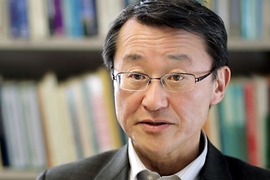This year marks the launch of the MIT Teaching with Digital Technology Awards. Co-sponsored by the Office of Digital Learning (ODL), the Dean of Undergraduate Education (DUE) and the Office of the Dean for Graduate Education (ODGE), the student-nominated awards recognize faculty and instructors who have effectively leveraged digital technology to improve teaching and learning at MIT. The winners are:
- Peter Dourmashkin, senior lecturer in the Department of Physics for 8.01/8.02 (Physics I and II);
- Kurt Fendt, principal research associate in Comparative Media Studies/Writing for 21G.420 (Visual Histories: German Cinema 1945 to Present);
- Lorna Gibson, the Matoula S. Salapatas Professor of Materials Science and Engineering and a professor of mechanical engineering for 3.032 (Mechanical Behavior of Materials);
- Max Goldman, lecturer in the Department of Electrical Engineering and Computer Science for 6.005 (Software Construction);
- Rob Miller, professor in the Department of Electrical Engineering and Computer Science for 6.005 (Software Construction); and
- Chris Terman, senior lecturer in the Department of Electrical Engineering and Computer Science for 6.004 (Computation Structures).
The awards were created to celebrate great innovations in teaching, provide positive student feedback to those faculty using digital technology, and inspire the entire MIT community by sharing the winners’ stories.
Students were asked one simple question on the nomination survey — “Why does this faculty instructor deserve this award?” — along with details around the types of digital technologies used and how their use helped improve classroom learning.
“We really wanted students to tell us what was most important to them,” says Sheryl Barnes, program manager of digital learning in residential education. “We didn’t want to prescribe or limit what we were looking for.”
In total, there were 132 nominations for 90 faculty members submitted. The finalists were selected by a judging committee consisting of ODL, DUE, and ODGE senior administrators plus five students who read and scored all of the nominations before choosing the winners.
So why are this year’s MIT Teaching with Digital Technology award-winners so deserving? The students say it best. Here are just a few of the top nominations (edited for length):
“Kurt Fendt used Annotation Studio so we could comment directly on articles and movie reviews and view each other's comments. He used Kanopy, so we could make and share movie clips. He also used Metamedia, so we could write and view longer responses to films. These technologies made the class more collaborative and facilitated more dynamic interaction.”
“Lorna Gibson used MITx more effectively than any other professor I've had. Her approach to the flipped classroom was unique, and I don't think I could have learned this difficult subject as well without her lecture videos, notes, and challenging problems on the online platform.”
“Rob Miller has a true dedication to improving learning through technology. I was blown away by the online resources available. It is incredibly cool that he makes large class sizes a boon rather than a detriment to learning. With the custom-for-6.005 code review tool, Caesar, I got more feedback — and more dynamic learning — with more people in the class.”
“Chris Terman developed several digital tools to better teach students computational structures. Ranging from instructional videos and notes explaining concepts to computer simulations that allow students to build their own computer processor, 6.004 is a fun, interesting class with great material and incredible delivery of content.”
While students naturally nominated the lead faculty for their courses, many of the above-mentioned projects included important work from postdocs and other educators — a point several award-winners wanted to make sure was mentioned.
Learn more about the MIT Teaching with Digital Technology Awards. Faculty looking to add digital tools and pedagogies to their teaching should visit Residential MITx, an online learning system used widely by MIT faculty for authoring and distributing course content such as videos, text, assessments, interactive elements, and automatic grading. Individuals can also request a Residential MITx course site or explore ODL's Digital Tools for the Classroom.









